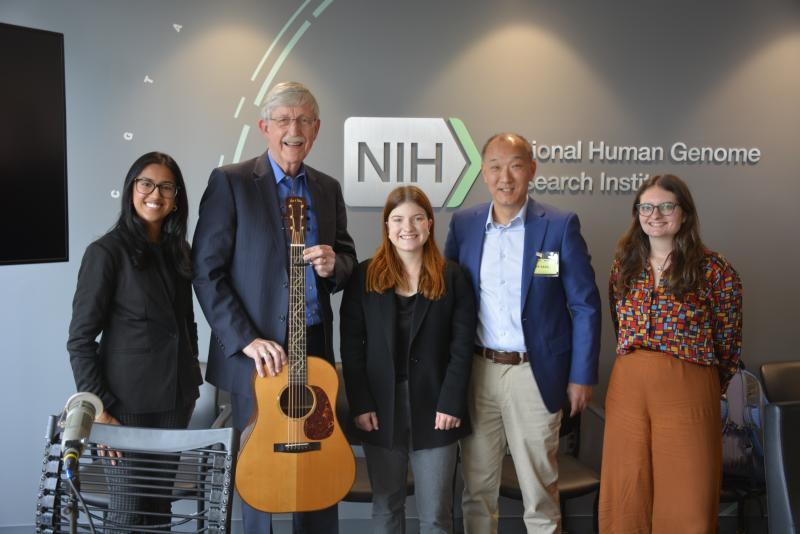Interviewing a Science Pioneer

Working behind the scenes to produce and promote a new University of Virginia podcast dedicated to showcasing the milestone achievements of University researchers and their ongoing studies in the fields of science, technology, engineering and mathematics, students Catherine Cossaboom and Reeya Verma are accustomed to maintaining a quiet profile when the microphones are on.
Even when they were offered the opportunities last month to accompany perhaps the most world-renowned living scientist associated with UVA in singing “The Good Old Song” as they wrapped up recording the latest “Hoos in STEM” podcast episode, the two College of Arts & Sciences undergraduates from Georgia politely declined. For Cossaboom and Verma, the March 28 road trip to the National Institutes of Health in Bethesda, Md. with podcast host and STEM Advisor to the Provost Ken Ono already seemed too good to be true.
Getting the opportunity to spend an afternoon with Francis Collins, the renowned researcher-physician who led the international effort to fully sequence humanity’s genetic code and who served three U.S. presidents as director of the NIH, the largest funder of basic and clinical biomedical research in the world, already felt surreal without trying to harmonize, Cossaboom said.
“Just getting the opportunity to work at the NIH for a day and to connect with Dr. Collins, knowing how he has drastically improved and saved so many lives, meeting him gave me so much inspiration for the impact I personally aspire to have in STEM,” said Cossaboom, a second-year student pursuing a double major in mathematics and cognitive science.
Both Cossaboom and Verma are Jefferson Scholars. Before recording, Cossaboom researches upcoming podcast guests and helps Ono craft his questions and topics he wants to cover. Verma, a first-year pre-med student interested in the role that storytelling can play in healthcare, manages social media promotion of the podcast and helps with content editing and research. (A recent UVA graduate, Mary Garner McGehee, who earned her A&S degree in Political and Social Thought, serves as producer of Hoos in STEM and many other podcasts produced through WTJU-91.1 FM and the Virginia Audio Collective.)
Previous episodes have featured, among others, conversations with award-winning UVA psychologist Bethany Teachman; Environmental Sciences professors Howie Epstein and Lauren Simkins, who research the Arctic and Antarctic Circle, respectively; and Dr. Marc Breton and Dr. Boris Kovatchev who spoke about their work at UVA developing an artificial pancreas.
“I really love the idea of making this podcast and sharing these stories about the journeys that professors and even students make within their research,” Verma said. “Storytelling is so powerful in its ability to communicate to a wide variety of audiences and to raise STEM awareness here at UVA. Ken [Ono] always incorporates so many personal anecdotes and brings life to the podcast after Catherine thoughtfully pre-interviews each guest to weave together these stories about STEM to make them flow for listeners.”
“I’m so fortunate to have Catherine, Reeya and MG working on ‘HOOS in STEM.’” Ono said. “Frankly, I’d be sunk without them.
“I’m completely awestruck by their creativity, drive and intellect. I predict that the day will come when future Hoos extol their achievements just like we’re celebrating Francis today.”
Ending with a song
The podcast with Collins covers a great deal of ground, staring with his youth growing up on a small farm in the Shenandoah Valley. Home-schooled until the sixth grade, Collins recounts how a 10thgrade chemistry teacher sparked his love for chemistry and the discovery that science is a detective story where clues on how the universe works are uncovered via experiments. Collins enrolled at UVA at the age of 16 and graduated in 1970. One of his early mentors on Grounds was the legendary chemistry professor Carl Trindle, who back then was a recent arrival “trying to figure out how to do research with undergrads who were pretty green,” Collins joked.
“But he took me on, and he taught me things about how to apply computational methods to chemical reactions … and I was totally jazzed about that,” Collins said.
Before leading government research agencies, Collins began his career as a geneticist who used cutting-edge molecular biology techniques to help identify the key genes involved in cystic fibrosis and other diseases. In 1993, he became director of one of the most audacious projects in the annals of science, what was then called the National Center for Human Genome Research. Seven years later, in June 2000, he stood alongside President Bill Clinton at the White House for the announcement that a working draft of the human genome had been completed.
This uncovering and mapping of mankind’s biological blueprint has led to countless medical discoveries and therapies.
At the end of the “HOOS in STEM” podcast recording in an NIH board room, Collins tuned his custom-made guitar — a send-off gift from his colleagues at the Human Genome Project, complete with a double-helix design in mother of pearl down the fret board. The retired NIH director joked that he didn’t get much practice singing “The Good Old Song” during his undergrad days in the late 1960s.
“It’s been a long time since I’ve sang this song, and when I was an undergraduate, off in the physics lab late at night instead of going to the games, I missed a few [opportunities], but let’s see if I can pull it off here,” Collins said.
As he sang, Cossaboom and Verma shared grins glancing at each other as they and the rest of the podcast team sat quietly, off microphone.
The latest episode of “HOOS in STEM,” featuring Collins’ conversation with Prof. Ken Ono is now available on Spotify and other podcast platforms.





